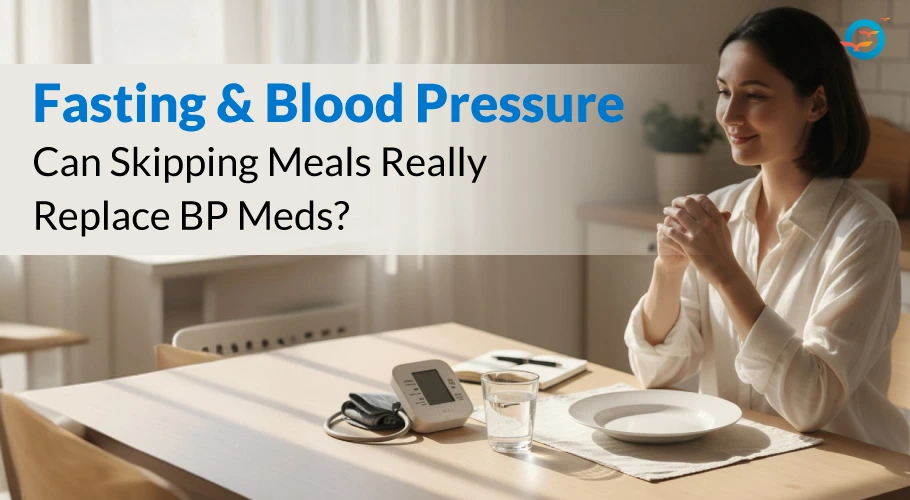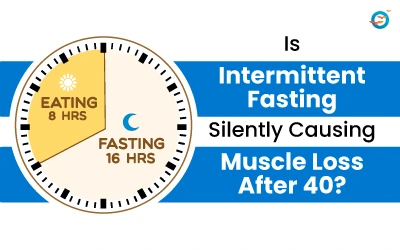Fasting and Blood Pressure: Can Skipping Meals Really Replace BP Meds?

High blood pressure often feels like a lifelong sentence to daily medication. But what if your own body could learn to regulate it naturally?
Emerging research reveals that fasting and blood pressure share a powerful link. When practiced correctly, fasting can help rebalance the body’s internal systems, lower BP levels, and in many cases, even reduce the need for medication under medical guidance.
Understanding the Root Cause of High Blood Pressure
Most people think high BP comes only from stress or salt but the real cause often lies deeper.
Constant eating and refined foods keep insulin levels elevated. High insulin signals the kidneys to retain sodium and water, increasing blood volume and pressure. It also triggers inflammation, weight gain, and hormonal imbalance.
In short, high BP isn’t just about salt, it’s about how the body handles energy, insulin, and sodium.
Fasting works on these root causes, helping the body restore balance rather than simply manage symptoms with drugs.
The Science: How Fasting Helps Lower Blood Pressure
So, does fasting lower blood pressure naturally?
Multiple studies suggest it does and the mechanism is both simple and scientific.
1. Flushes Out Excess Sodium and Water
Lower insulin during fasting allows the kidneys to release stored sodium and fluid, reducing pressure on the blood vessels.
2. Relaxes the Nervous System
Fasting reduces stress hormones like adrenaline and cortisol, calming the sympathetic (“fight or flight”) response. This helps arteries relax and BP normalize.
3. Improves Blood Vessel Function
Fasting reduces inflammation and increases nitric oxide, which makes arteries more elastic and responsive.
4. Encourages Fat and Weight Loss
Losing even 1 kg of body weight can lower systolic BP by about 1 mmHg. Fasting supports fat burning, especially around the abdomen where fat most affects BP.
Clinical research published in PubMed shows that medically supervised fasting can lower systolic BP by 10–20 mmHg, results comparable to medication therapy.
Can Fasting Really Replace BP Medication?
In structured medical programs, many people have experienced steady BP normalization through fasting.
As insulin resistance improves and sodium balance resets, the body begins to regulate blood pressure on its own. However, medication should never be stopped abruptly; this must only happen under medical supervision.
How to Fast Safely with High Blood Pressure?
Fasting is a powerful healing tool, but it needs the right approach. Here’s how to start safely:
- Begin with 12–14 hours of intermittent fasting and increase gradually.
- Drink plenty of water, herbal teas, or vegetable broths to maintain electrolytes.
- Do not change medication doses on your own; consult your doctor first.
- When eating, choose whole plant-based meals rich in fiber, potassium, and magnesium.
- Track your BP regularly during fasting periods.
Even small, consistent changes can deliver measurable results over time.
Who Should Avoid Fasting for BP Control?
Fasting is not recommended for:
- People with uncontrolled or severe hypertension
- Those with chronic kidney disease or heart failure
- Pregnant or breastfeeding women
Fasting must always fit the individual’s health condition and should be guided by a healthcare professional familiar with metabolic and cardiovascular physiology.
Conclusion
Fasting is not deprivation, it’s restoration.
When practiced mindfully, it gives the body space to heal, rebalance hormones, and reset blood pressure naturally. Over time, this can reduce dependence on medication and support lasting heart health.
The message is clear: before reaching for another pill, it might be time to let your body do the healing.
FAQs
1. Can fasting really lower blood pressure naturally?
Yes. Fasting lowers insulin, sodium, and stress hormones, all of which help reduce BP naturally.
2. Is fasting safe for people with high blood pressure?
Yes, if done with proper hydration and under medical supervision.
3. Can I stop my BP medication if my blood pressure improves with fasting?
Only with a doctor’s approval. Stopping medication abruptly can cause hypotension.
4. Which type of fasting helps control high BP effectively?
Intermittent fasting (12–16 hours) and supervised therapeutic fasting have shown strong results.
5. How can I fast safely while taking BP medication?
Monitor your BP daily, drink enough fluids, and let your doctor adjust the dosage if necessary.
6. Who should avoid fasting for blood pressure control?
Those with chronic heart, kidney, or endocrine disorders should fast only under medical supervision.

